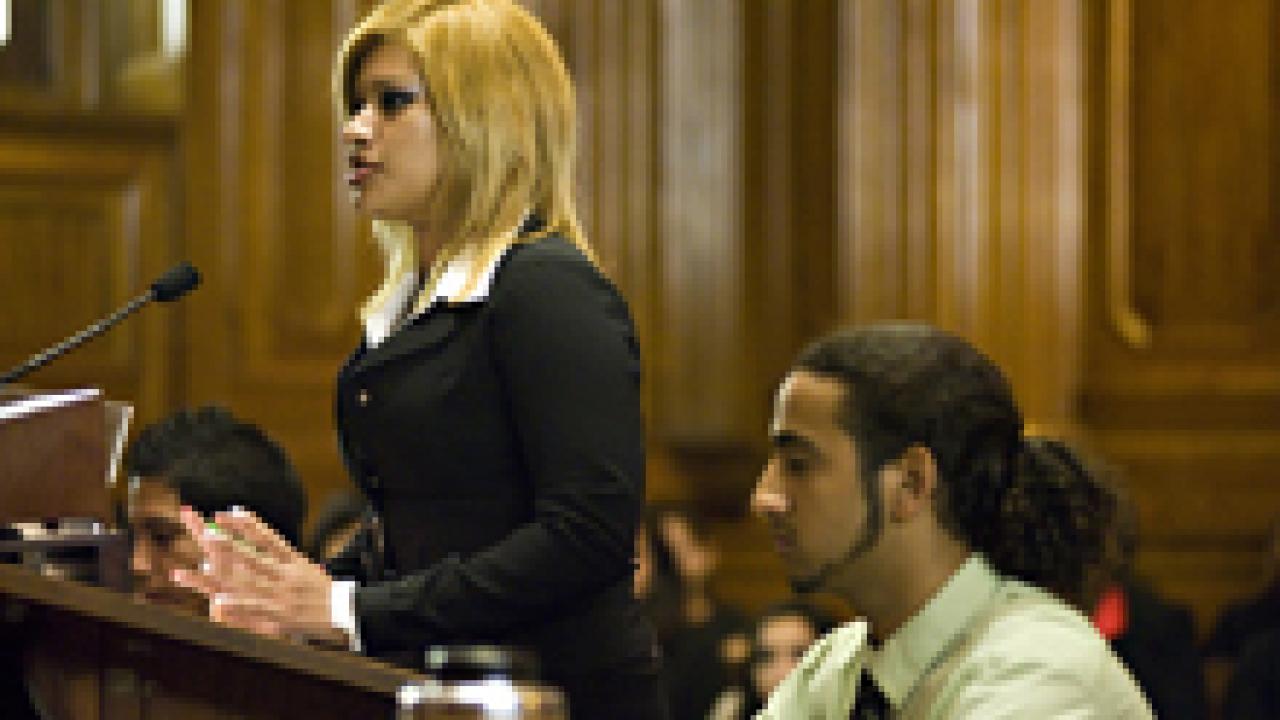Growing up in a family of Central Valley farm workers, Laura Pulido watched as her mother became disabled due to a repetitive strain injury, stood by as her cousins seethed over short paychecks, and listened as relatives recounted episodes of heatstroke, falls from ladders and other preventable injuries in the fields.
All of which made Pulido determined to become an attorney — and a perfect candidate for the King Hall Outreach Program/Pre-Law Undergraduate Scholars Program at the UC Davis School of Law.
Now in its ninth year, KHOP/PLUS aims to increase diversity in the law school pipeline. Nationally, the need for greater diversity in legal education is acute. According to the Law School Admission Council, only one in 25 lawyers is Native American, Hispanic, Asian American or African American.
70-hour workweeks
Through KHOP/PLUS, eligible college juniors and seniors receive two years of mentoring and prelaw advising during the school year, plus four weeks of intensive academic preparation each summer.
The program is supported by funding from the UC Davis School of Law, the Law School Admission Council, the UC Office of the President and private donations.
Pulido, and the 33 other KHOP/PLUS participants in the 2008 summer session put in 70-hour, six-day workweeks from July 12 through Aug. 8. From 9 a.m. to 5 p.m., Monday through Friday, they took classes in writing and logical reasoning, mock trial practice and Law School Admission Test preparation.
From 6 to 9 p.m. Monday through Thursday, they went back to the classroom for tutoring. At 8:30 a.m. every Saturday, they took a four-hour practice Law School Admission Test. From 12:30 to 4:30 p.m. every Sunday, they reviewed the previous day’s LSAT results.
Sharon Pinkney, assistant dean for admission and enrollment at the UC Davis School of Law, originated the program in 2000. It remains the only one of its kind at a University of California law school.
Unlike many other law school outreach programs around the country, KHOP/PLUS does not offer law courses. Instead, its primary goal is to raise students’ grades and prepare them to score well on the LSAT.
“We didn’t want to just show them what a torts class is, because they’ll learn that in law school,” Pinkney said. “We want to help them get into law school.”
Of the 108 students who have been through KHOP/PLUS since its inception, 11 have graduated from law school, nine are currently enrolled and so far three have been admitted to start in fall 2009. In addition, 11 have entered graduate school at Princeton, UCLA and other universities.
Success stories include Kyanna Williams, a 2006 graduate of the UC Davis School of Law who now works as an attorney for Legal Services of Northern California. Another is Alice Cheng, a 2005-06 KHOP/PLUS participant. Cheng, now a second-year law student at UC Davis, served as a KHOP resident adviser and tutor last summer.
To qualify for the program, applicants must come from a low-income family or be first-generation college goers. They must have finished their sophomore college year with at least a 3.0 grade-point average.
‘Getting ready for a boxing match’
LSAT preparation is part of the curriculum.
“A lot of the students have never taken a high-stakes standardized test before they take their first practice LSAT with us,” Pinkney said. “That’s a big hurdle for them. Some of the students speak two or three languages, but if English isn’t their first language, they’re at a disadvantage on the LSAT.”
Matthew Peng, a senior at San Jose State University, recognizes the challenges. Peng immigrated with his parents from Guangdong, China, at age 9 and is the first in his family to attend college.
“Studying for the LSAT is like getting ready for a boxing match,” Peng said. “You keep practicing until you can score a knockout.”
KHOP/PLUS also seeks to increase students’ comfort and confidence in a law school environment. Participants last summer went river-rafting with Kevin Johnson, dean of the UC Davis School of Law, had lunch with Cruz Reynoso, a professor at the law school who rose from farmworker’s son to justice of the California Supreme Court, and visited courtrooms in Sacramento and Oakland.
The program has only deepened Pulido’s commitment to becoming a lawyer and strengthened her belief that her background will make her a good one.
“All the injustices I’ve seen, they make me want to help,” said Pulido, a senior at UC Davis with a major in political science/public service and minor in education.
All walks of life
A diverse legal profession is essential, said Johnson, the law school’s dean.
“We need lawyers from all walks of life,” Johnson said. “Law is driven by the experiences of life and we need lawyers from many different perspectives and backgrounds to adequately represent the clients — corporate and individual — of today and tomorrow. Public law schools, in my estimation, have the duty and obligation to strive to diversify the legal profession.”
The UC Davis School of Law’s 2008 entering class was 26 percent Asian or Pacific Islander, 7 percent Hispanic and 1 percent African American. The class has one Native American student.
More information: www.ucdavis.edu (click on “Lure of the Law")
Media Resources
Clifton B. Parker, Dateline, (530) 752-1932, cparker@ucdavis.edu
